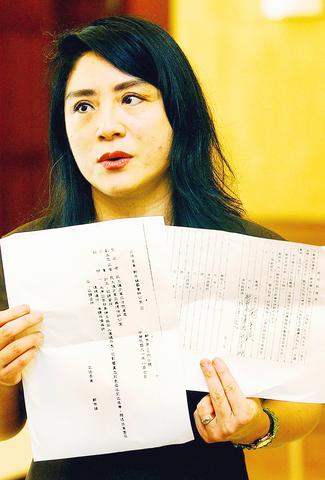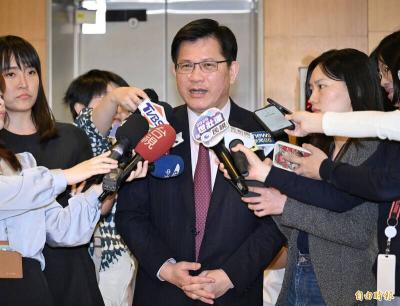Adding heat to his triangular romance, DPP lawmaker Cheng Yu-cheng (鄭余鎮) yesterday asked a controversial lawyer to help him divorce his wife whom he painted as "incompatible and incommunicable."
While he stayed mum on his alleged bigamy, a US Web site for a county recorder's office showed that the legislator and his aide, Sophie Wang (王筱嬋), were married on July 2.
Bellicose lawyer Chiu Chang (邱彰), who in June was deprived of her office as a DPP legislator-at-large, appeared at the legislature yesterday morning, saying she wanted to deliver a divorce agreement to Cheng's wife Lu Pei-ying (呂珮茵).

PHOTO: LIU HSIN-TE, TAIPEI TIMES
Chiu said she did so at the request of the lawmaker, who is still in the US with Wang.
Cheng said in the divorce agreement that he and his wife, owing to incompatible personalities, have been unable to communicate or live with each other for years.
"So I have decided to seek a divorce and am willing to give my monthly salary [as a legislator] to the other party," the agreement signed by Cheng said.
None of Cheng's aides would take the document, which Chiu later displayed to the media. Lu, who has said she will never agree to a divorce, has quit coming to the legislature on the advice of family members that she stay out of the public eye.
According to Chiu, her client can still get a divorce, as US law stipulates that anyone who stays in the country for six weeks may file for a divorce.
A US court may grant a divorce request as long as the petitioner has fulfilled their obligation of informing their spouse of their intent to divorce, the lawyer said.
She quoted Cheng as saying he would give up his house, property, and money in exchange for his freedom.
"I want to live my own life now that I am almost 60," the lawmaker reportedly told his lawyer on the phone. "I only hope Lu would let me go. Whatever terms she puts forth, I will try to accommodate."
Chiu, who herself has been divorced twice, said she would fly to the US next week to handle the case and urged Lu to sign the agreement.
"Marriage should not be used as a tool to enslave another," she said. "It is meaningless to keep a spouse when love ceases to exist."
The blunt-speaking lawyer added that Cheng and Lu have been separated for more than 20 years.
She insisted that US codes apply to Taiwanese couples here after the country's accession to the World Trade Organization early this year. Chiu would not comment on Cheng's alleged bigamy or financial woes, saying she is not in charge of her client's financial affairs.
The web site of the Clark County Recorder's Office in Las Vegas, Nevada shows that Cheng and Wang had been married on July 2. Their marriage certificate is numbered D454428.
Though bigamy is outlawed in Taiwan, there is little law-enforcement officers can do with Cheng as long as he does not seek to have his second marriage registered here, according to legal experts.
They said the government can not punish any bigamist whose second marriage is carried out overseas and the legitimacy of the second marriage remains uncertain.
However, they cast doubt on Chiu's contention that the lawmaker can unilaterally divorce Lu despite the wife's objection.
A Ministry of Justice official said the country will not recognize any divorce involving ROC citizens whose rights are not properly protected during its proceedings.
Meanwhile Cheng's family members would not talk to the media, saying the only thing they can do now is patiently wait for the lawmaker to come around and return to their fold.

Taiwan would welcome the return of Honduras as a diplomatic ally if its next president decides to make such a move, Minister of Foreign Affairs Lin Chia-lung (林佳龍) said yesterday. “Of course, we would welcome Honduras if they want to restore diplomatic ties with Taiwan after their elections,” Lin said at a meeting of the legislature’s Foreign Affairs and National Defense Committee, when asked to comment on statements made by two of the three Honduran presidential candidates during the presidential campaign in the Central American country. Taiwan is paying close attention to the region as a whole in the wake of a

President William Lai (賴清德) has appointed former vice president Chen Chien-jen (陳建仁) to attend the late Pope Francis’ funeral at the Vatican City on Saturday on his behalf, the Ministry of Foreign Affairs said today. The Holy See announced Francis’ funeral would take place on Saturday at 10am in St Peter’s Square. The ministry expressed condolences over Francis’ passing and said that Chen would represent Taiwan at the funeral and offer condolences in person. Taiwan and the Vatican have a long-standing and close diplomatic relationship, the ministry said. Both sides agreed to have Chen represent Taiwan at the funeral, given his Catholic identity and

Chinese Nationalist Party (KMT) Chairman Eric Chu (朱立倫), spokeswoman Yang Chih-yu (楊智伃) and Legislator Hsieh Lung-chieh (謝龍介) would be summoned by police for questioning for leading an illegal assembly on Thursday evening last week, Minister of the Interior Liu Shyh-fang (劉世芳) said today. The three KMT officials led an assembly outside the Taipei City Prosecutors’ Office, a restricted area where public assembly is not allowed, protesting the questioning of several KMT staff and searches of KMT headquarters and offices in a recall petition forgery case. Chu, Yang and Hsieh are all suspected of contravening the Assembly and Parade Act (集會遊行法) by holding

Taiwan would welcome the return of Honduras as a diplomatic ally if the next president of that country decides to make such a move, Minister of Foreign Affairs Lin Chia-lung (林佳龍) said today. “We would welcome Honduras if they want to restore diplomatic ties with Taiwan after their elections,” Lin said during a legislative hearing. At the same time, Taiwan is paying close attention to the Central American region as a whole, in the wake of a visit there earlier this year by US Secretary of State Marco Rubio, Lin said. Rubio visited Panama, El Salvador, Costa Rica and Guatemala, during which he